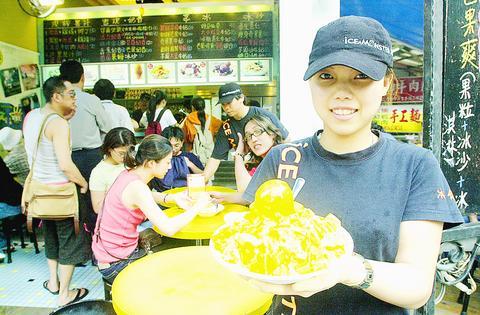Ice Monster (
"I have confidence in the franchise project since Japanese tourists constitute 40 percent of our customer base," Frank Lo (
The first overseas Ice Monster branch may open in spring next year in Tokyo's Shibuya district depending on how quick the Japanese authorities approve of the food-safety of his recipe, Lo said.

PHOTO: GEORGE TSORNG
One franchise owner yesterday said that breaking into the Japanese market would require tailoring products for the Japanese palate.
"Flavors that can be accepted by consumers in that country is a prerequisite," said Johnson Fu (
Fu has franchised out over 700 pearl-milk-tea shops to the US and Asia.
He said challenges may lie ahead for Ice Monster, adding, "A product that sells well in Taipei may not necessarily be successful in Japan."
While the innovative use of chopped mango stacked on shaved ice may have been the latest snack craze five years ago when it first hit the domestic market, Lo said he has been mixing mango and condensed milk into the traditional ice concoction as a summer snack since he was a child.
However, he never expected that his homemade ice recipe could be a marketable franchise.
One customer standing in line in 32?C heat yesterday waiting to munch down a mango ice said she came to Ice Monster -- as opposed to five others in the vicinity -- for two reasons.
"Ice Monster tastes better and, besides, they have the reputation," said Yvonne Fang (
Lo opened his ice stand in its current location in 1995 on Yungkang Street, but came close to shutting it after three years due to poor sales.
His financial woes drove Lo to develop a new flavor -- mango -- at NT$100 per plate.
"The new product soon boosted my business as queues of customers flocked to my door after being told by word-of-mouth by guests who had tried it," Lo said.
In addition to the streams of ice gluttons that consume on average 1,500 plates of shaved ice per day, Lo's mango ice also brought media exposure such as the Japanese food show TV Champion, which put him on the Japanese tourist map, Lo said.
Lo sparked a host of copycats also selling shaved mango ice.
The basic product is quite simple: sliced mango, condensed milk and his homemade syrup.
Lo admits his mango ice has nothing different in it from other ice shops.
"When people ask me about the secret to my success, I always tell them that it was an accident," he said. "Freshness is the key."
Unlike other ice shops that have developed into chain stores nationwide, Lo said he would not mass produce his product until the quality is assured.
Lo has until recently put off a two-year old plan to start the franchise project.
If his mango ice business flies in Japan, however, Lo said he will try to bring the sweet fruit taste to Hawaii and southern California's sizeable Japanese population.

KEEPING UP: The acquisition of a cleanroom in Taiwan would enable Micron to increase production in a market where demand continues to outpace supply, a Micron official said Micron Technology Inc has signed a letter of intent to buy a fabrication site in Taiwan from Powerchip Semiconductor Manufacturing Corp (力積電) for US$1.8 billion to expand its production of memory chips. Micron would take control of the P5 site in Miaoli County’s Tongluo Township (銅鑼) and plans to ramp up DRAM production in phases after the transaction closes in the second quarter, the company said in a statement on Saturday. The acquisition includes an existing 12 inch fab cleanroom of 27,871m2 and would further position Micron to address growing global demand for memory solutions, the company said. Micron expects the transaction to

Vincent Wei led fellow Singaporean farmers around an empty Malaysian plot, laying out plans for a greenhouse and rows of leafy vegetables. What he pitched was not just space for crops, but a lifeline for growers struggling to make ends meet in a city-state with high prices and little vacant land. The future agriculture hub is part of a joint special economic zone launched last year by the two neighbors, expected to cost US$123 million and produce 10,000 tonnes of fresh produce annually. It is attracting Singaporean farmers with promises of cheaper land, labor and energy just over the border.

US actor Matthew McConaughey has filed recordings of his image and voice with US patent authorities to protect them from unauthorized usage by artificial intelligence (AI) platforms, a representative said earlier this week. Several video clips and audio recordings were registered by the commercial arm of the Just Keep Livin’ Foundation, a non-profit created by the Oscar-winning actor and his wife, Camila, according to the US Patent and Trademark Office database. Many artists are increasingly concerned about the uncontrolled use of their image via generative AI since the rollout of ChatGPT and other AI-powered tools. Several US states have adopted

A proposed billionaires’ tax in California has ignited a political uproar in Silicon Valley, with tech titans threatening to leave the state while California Governor Gavin Newsom of the Democratic Party maneuvers to defeat a levy that he fears would lead to an exodus of wealth. A technology mecca, California has more billionaires than any other US state — a few hundred, by some estimates. About half its personal income tax revenue, a financial backbone in the nearly US$350 billion budget, comes from the top 1 percent of earners. A large healthcare union is attempting to place a proposal before